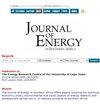Non-linear multivariate models for estimating global solar radiation received across five cities in South Africa
IF 0.6
4区 工程技术
Q4 ENERGY & FUELS
引用次数: 6
Abstract
South Africa continues to lag globally in the adoption of renewable energy systems despite a notable decrease in the cost of applicable renewable energy technologies over the past five years. Most applications of potential solar renewable energy systems are currently in various stages of investigation, leaving this readily accessible resource capacity idle. The present study proposes linear and non-linear analysis of multivariate models for estimating global solar radiation (GSR) received across five cities in South Africa. The significance of this study is to provide effective GSR estimation in the application of solar technologies, while increasing their implementation. The dependency of GSR on meteorological variables such as air temperature, relative humidity and relative sunshine duration was evaluated for January 2007 to June 2018 to realise estimation models for each of the study sites. The Hargreaves-Samani and Angstrom-Prescott empirical models served as the basis for single variable analysis of GSR reliance on each meteorological parameter and their relative variations. The results indicated that the proposed non-linear, multivariate equations perform better than the empirical models as well as linear, single variable regression equations. The suggested models are site-specific and demonstrate a strong correlation to historic GSR values with low, acceptable error indicators. It was also recognised that second- and third-order relationships between the clearness index and multiple meteorological variables provide a more accurate description of GSR for most of the cities under study. These methods are cost-effective, easily accessible and appropriate for the evaluation of the feasibility of solar photovoltaic technologies in South Africa.估算南非五个城市接收的全球太阳辐射的非线性多元模型
南非在采用可再生能源系统方面继续落后于全球,尽管在过去五年中适用的可再生能源技术的成本显著下降。大多数潜在的太阳能可再生能源系统的应用目前处于不同的研究阶段,使这种容易获得的资源能力闲置。本研究提出了用于估计南非五个城市接收的全球太阳辐射(GSR)的多元模型的线性和非线性分析。本研究的意义在于为太阳能技术的应用提供有效的GSR估算,同时增加太阳能技术的实施。评估了2007年1月至2018年6月期间GSR对气温、相对湿度和相对日照时数等气象变量的依赖关系,以实现每个研究地点的估算模型。Hargreaves-Samani和Angstrom-Prescott经验模型作为GSR依赖各气象参数及其相对变化的单变量分析的基础。结果表明,本文提出的非线性多变量回归方程比经验模型和单变量线性回归方程具有更好的性能。建议的模型是特定于站点的,并且与历史GSR值具有较低的,可接受的误差指标有很强的相关性。人们还认识到,对于研究中的大多数城市,清晰度指数与多个气象变量之间的二阶和三阶关系提供了更准确的GSR描述。这些方法具有成本效益,易于获得,适合评价南非太阳能光电技术的可行性。
本文章由计算机程序翻译,如有差异,请以英文原文为准。
求助全文
约1分钟内获得全文
求助全文
来源期刊

Journal of Energy in Southern Africa
ENERGY & FUELS-
CiteScore
3.00
自引率
0.00%
发文量
16
审稿时长
6 months
期刊介绍:
The journal has a regional focus on southern Africa. Manuscripts that are accepted for consideration to publish in the journal must address energy issues in southern Africa or have a clear component relevant to southern Africa, including research that was set-up or designed in the region. The southern African region is considered to be constituted by the following fifteen (15) countries: Angola, Botswana, Democratic Republic of Congo, Lesotho, Malawi, Madagascar, Mauritius, Mozambique, Namibia, Seychelles, South Africa, Swaziland, Tanzania, Zambia and Zimbabwe.
Within this broad field of energy research, topics of particular interest include energy efficiency, modelling, renewable energy, poverty, sustainable development, climate change mitigation, energy security, energy policy, energy governance, markets, technology and innovation.
 求助内容:
求助内容: 应助结果提醒方式:
应助结果提醒方式:


